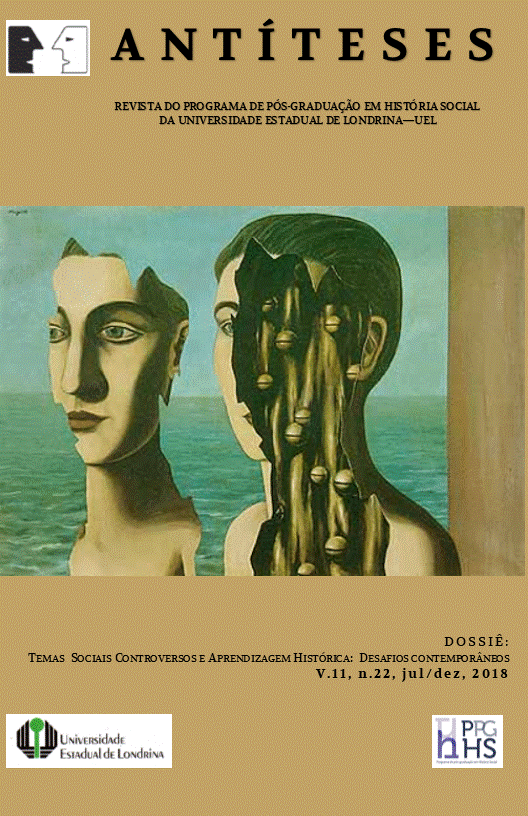Burdening History and ethnocetrism: the History teaching and Rwanda's genocide on the web
DOI:
https://doi.org/10.5433/1984-3356.2018v11n22p533Keywords:
History teaching, Burdening History, Ethnocentrism, Rwandan genocideAbstract
The historical consciousness in the contemporary world has the vital function of instituting temporal sense to human life, through specific processes of learning, consciousness articulates past, present and future in the same temporal structure that establishes historical sense to the individual and to the world. The temporal changes lived and suffered as instability need new meanings in the course of time, they need historical sense for the continuity of daily human activities. The temporal changes that destabilize life can be traumatic, hostile, bitter, sad, heavy, conflicting, difficult to live, what the German historian and didaticist Bodo von Borries (2016) calls Burdening History, which are difficult stories to be taught and learned because they carry strong feelings of guilt, shame and mourning. Based on this assumption, we tried to contribute with the debate, from the reflection about the History teaching in Rwanda, particularly about the so-called Rwanda genocide. The study looked at historical content disclosure Web sites. The use of the internet in the school environment is growing, both by children and young people, as well as by teachers.Downloads
Download data is not yet available.
References
ADORNO, Theodor W. Educação após Auschwitz. In: ADORNO, Theodor W. Palavras e sinais:
modelos críticos 2. Petrópolis: Vozes, 1995.
AMIN, Samir. Eurocentrismo: crítica de uma ideologia. Lisboa: Dinossauro, 1994.
ARENDT. Hannah. Origens do totalitarismo. São Paulo, Cia das Letras, 1989.
BADI, Mbuyi K. África em la globalización neoliberal: las alternativas africanas. Theomai:
estudios sobre sociedad, naturaleza y desarrollo, n. 17, 2008.
BORRIES, Bodo von. Lidando com histórias difíceis. In: FRONZA, Marcelo; SCHMIDT, Maria
A. M. S.; NECHI, Lucas P. Jovens e consciência histórica. Curitiba: W.A. Editores, 2016. p. 32-41.
CAMPOS, Paulo F. de S. Ensino, a história e a lei 10.639. História & Ensino, Londrina, v. 10, p.
41-52, out. 2004.
CARAMEZ, Cláudia S. A aprendizagem histórica de professores mediada pelas tecnologias da informação e comunicação: perspectivas da educação histórica. 2014. Dissertação (Mestrado em Educação) - Programa de Pós-Graduação em Educação, Universidade Federal do Paraná, Curitiba, 2014.
COMPARATO, Fábio K. A afirmação histórica dos direitos humanos. São Paulo: Saraiva, 2003.
FONSECA, Danilo F. da. África entre classes e etnias: África do Sul (1948-1994) e Ruanda (1959- 1994). Saarbrücken: Novas Edições Acadêmicas, 2015.
HABERMAS, Jürgen. Bestialidade e humanidade: uma guerra na fronteira entre o direito e a moral. Die Zeit, v. 54, p. 1-8, 1999.
LEE, Peter. Em direção a um conceito de literacia histórica. Educar em Revista, Curitiba, Especial, p. 131-150, 2006.
LEE, Peter. Por que aprender História? Educar em Revista, Curitiba, n. 42, p. 19-42, out./dez.
2011.
LEVENSON, Ellie, a shame on all humanity, The Guardian, disponível no site: https://www.theguardian.com/education/2009/mar/31/rwanda-genocide, acesso no dia 27/09/2018.
OAKESHOTT, Michael. Presente, futuro e passado. In: OAKESHOTT, Michael. Sobre a história e outros ensaios. Rio de Janeiro: Topbooks, 2003. p. 43-98.
OLIVEIRA, Jackes A. de. Educação histórica e aprendizagem da "história difícil" em vídeos do youtube. 2016. Dissertação (Mestrado em Educação) - Programa de Pós-Graduação em Educação, Universidade Federal do Paraná, Curitiba, 2016.
RÃœSEN, Jörn. Razão histórica: teoria da história: os fundamentos da ciência histórica.
Brasília: Editora Universidade de Brasília, 2001.
RÃœSEN, Jörn. Historiografia comparativa intercultural. In: MALERBA, Jurandir. (Org.). A História escrita: teoria e história da historiografia. São Paulo: Contexto, 2006.
RÃœSEN, Jörn. Como dar sentido ao passado: questões relevantes de meta-história. História da Historiografia, n. 02, p. 163-209, mar. 2009.
SCHMIDT, Maria A. M. S. Aprendizagem da "burdening history": desafios para a educação
histórica. Mneme - Revista de Humanidades, Caicó, v. 16, n. 36, p. 10-26, 21 dez. 2015.
SCHMIDT, Maria A. M. S. A educação histórica e o ensino da história difícil. GERMINARI, Geyso D.; GILLIES, Ana M. R. Ensino de história e debates contemporâneos. Guarapuava: Unicentro, 2017. p. 13-27.
SILVA, Daniel N. "Guerra civil em Ruanda". Brasil Escola. Disponível em
<https://brasilescola.uol.com.br/historiag/guerra-civil-ruanda.htm>. Acesso em 25 de setembro de 2018a.
SILVA, Érica. "Guerra Civil em Ruanda"; Uol Educação. Disponível em: https://educacao.uol.com.br/planos-de-aula/medio/historia-geral-guerra-civil-em- ruanda.htm. Acesso em 25 de setembro de 2018b.
STRAUS, Scott. The order of the genocide: race, power, and war in Rwanda. Ithaca, Cornell University Press, 2006.
modelos críticos 2. Petrópolis: Vozes, 1995.
AMIN, Samir. Eurocentrismo: crítica de uma ideologia. Lisboa: Dinossauro, 1994.
ARENDT. Hannah. Origens do totalitarismo. São Paulo, Cia das Letras, 1989.
BADI, Mbuyi K. África em la globalización neoliberal: las alternativas africanas. Theomai:
estudios sobre sociedad, naturaleza y desarrollo, n. 17, 2008.
BORRIES, Bodo von. Lidando com histórias difíceis. In: FRONZA, Marcelo; SCHMIDT, Maria
A. M. S.; NECHI, Lucas P. Jovens e consciência histórica. Curitiba: W.A. Editores, 2016. p. 32-41.
CAMPOS, Paulo F. de S. Ensino, a história e a lei 10.639. História & Ensino, Londrina, v. 10, p.
41-52, out. 2004.
CARAMEZ, Cláudia S. A aprendizagem histórica de professores mediada pelas tecnologias da informação e comunicação: perspectivas da educação histórica. 2014. Dissertação (Mestrado em Educação) - Programa de Pós-Graduação em Educação, Universidade Federal do Paraná, Curitiba, 2014.
COMPARATO, Fábio K. A afirmação histórica dos direitos humanos. São Paulo: Saraiva, 2003.
FONSECA, Danilo F. da. África entre classes e etnias: África do Sul (1948-1994) e Ruanda (1959- 1994). Saarbrücken: Novas Edições Acadêmicas, 2015.
HABERMAS, Jürgen. Bestialidade e humanidade: uma guerra na fronteira entre o direito e a moral. Die Zeit, v. 54, p. 1-8, 1999.
LEE, Peter. Em direção a um conceito de literacia histórica. Educar em Revista, Curitiba, Especial, p. 131-150, 2006.
LEE, Peter. Por que aprender História? Educar em Revista, Curitiba, n. 42, p. 19-42, out./dez.
2011.
LEVENSON, Ellie, a shame on all humanity, The Guardian, disponível no site: https://www.theguardian.com/education/2009/mar/31/rwanda-genocide, acesso no dia 27/09/2018.
OAKESHOTT, Michael. Presente, futuro e passado. In: OAKESHOTT, Michael. Sobre a história e outros ensaios. Rio de Janeiro: Topbooks, 2003. p. 43-98.
OLIVEIRA, Jackes A. de. Educação histórica e aprendizagem da "história difícil" em vídeos do youtube. 2016. Dissertação (Mestrado em Educação) - Programa de Pós-Graduação em Educação, Universidade Federal do Paraná, Curitiba, 2016.
RÃœSEN, Jörn. Razão histórica: teoria da história: os fundamentos da ciência histórica.
Brasília: Editora Universidade de Brasília, 2001.
RÃœSEN, Jörn. Historiografia comparativa intercultural. In: MALERBA, Jurandir. (Org.). A História escrita: teoria e história da historiografia. São Paulo: Contexto, 2006.
RÃœSEN, Jörn. Como dar sentido ao passado: questões relevantes de meta-história. História da Historiografia, n. 02, p. 163-209, mar. 2009.
SCHMIDT, Maria A. M. S. Aprendizagem da "burdening history": desafios para a educação
histórica. Mneme - Revista de Humanidades, Caicó, v. 16, n. 36, p. 10-26, 21 dez. 2015.
SCHMIDT, Maria A. M. S. A educação histórica e o ensino da história difícil. GERMINARI, Geyso D.; GILLIES, Ana M. R. Ensino de história e debates contemporâneos. Guarapuava: Unicentro, 2017. p. 13-27.
SILVA, Daniel N. "Guerra civil em Ruanda". Brasil Escola. Disponível em
<https://brasilescola.uol.com.br/historiag/guerra-civil-ruanda.htm>. Acesso em 25 de setembro de 2018a.
SILVA, Érica. "Guerra Civil em Ruanda"; Uol Educação. Disponível em: https://educacao.uol.com.br/planos-de-aula/medio/historia-geral-guerra-civil-em- ruanda.htm. Acesso em 25 de setembro de 2018b.
STRAUS, Scott. The order of the genocide: race, power, and war in Rwanda. Ithaca, Cornell University Press, 2006.
Downloads
Published
2019-01-30
How to Cite
FONSECA, Danilo Ferreira da; GERMINARI, Geyso Dongley. Burdening History and ethnocetrism: the History teaching and Rwanda’s genocide on the web. Antíteses, [S. l.], v. 11, n. 22, p. 533–552, 2019. DOI: 10.5433/1984-3356.2018v11n22p533. Disponível em: https://ojs.uel.br/revistas/uel/index.php/antiteses/article/view/35078. Acesso em: 24 dec. 2025.
Issue
Section
Dossier
License
Copyright (c) 2018 Antiteses

This work is licensed under a Creative Commons Attribution 4.0 International License.
The journal reserves the copyright on the contributions published, without material compensation for the author, and may make them available online in Open Access mode, through its own system or other databases; you can also make normative, orthographic and grammatical changes in the originals, in order to maintain the cultured standard of the language, with the final consent of the authors. The opinions expressed by the authors are their sole responsibility.










